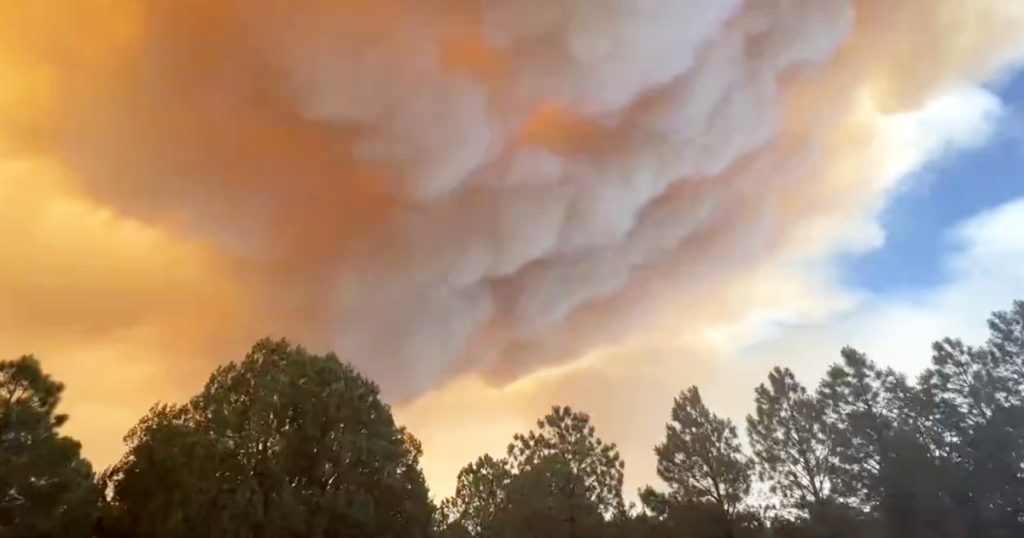Residents in the New Mexico village of Ruidoso were forced to evacuate on Monday due to a wildfire that grew to over 5,000 acres in a matter of hours. The South Fork Fire, discovered on the Mescalero Reservation west of Ruidoso, prompted officials to issue immediate mandatory evacuation orders. The fire was characterized by extreme behavior and rapid growth, making containment efforts challenging. Multiple structures were threatened, although the extent of the damage was still unknown as of Monday night. Residents were urged to leave without attempting to pack valuables or defend their property, as the situation was rapidly escalating.
Mary Lou Minic, one of the evacuees, described the urgency of the situation, recalling how she had to quickly leave her home without hesitation. Hot ash was reported falling in nearby communities, and sections of U.S. Highway 70 were closed due to the fire. The Mescalero Apache Tribe was actively assisting with evacuation efforts and establishing emergency shelters for those affected. In Ruidoso, power was shut off by request of first responders to prioritize safety measures. The community came together to provide support and shelter for evacuees, highlighting the importance of unity during times of crisis.
The South Fork Fire underscored the heightened fire danger faced by many regions in the Southwest, with New Mexico and parts of California experiencing extreme conditions that fueled wildfires. The blaze added to the challenges faced by emergency responders already dealing with red flag warnings due to dry air and strong winds. In California, the Aero Fire erupted in Calaveras County, necessitating evacuations and causing power outages for thousands of residents. Aerial firefighting efforts were deployed to combat the blaze, showcasing the collaborative response to mitigate the impact of wildfires on communities.
As the fire continued to spread, officials emphasized the importance of safety and evacuation orders to protect residents and prevent casualties. The rapid intensification of the South Fork Fire highlighted the unpredictable nature of wildfires and the need for preparedness measures to safeguard individuals and property. The community’s swift response to the evacuation orders demonstrated the importance of heeding official warnings and prioritizing personal safety during emergencies. The outpouring of support from neighboring cities and organizations further emphasized the solidarity and resilience of communities facing natural disasters.
The widespread impact of wildfires on communities in New Mexico and California underscored the urgent need for proactive measures to address escalating fire risks. The combination of dry conditions, strong winds, and extreme fire behavior posed significant challenges for firefighters and emergency responders tasked with containing the blazes. Authorities continued to investigate the cause of the South Fork Fire and implement strategies to prevent future incidents. The shared commitment to protecting lives and property underscored the collective responsibility in safeguarding communities and supporting recovery efforts in the aftermath of natural disasters.
The evacuation of Ruidoso and surrounding areas due to the South Fork Fire highlighted the vulnerability of communities to wildfires and the importance of efficient emergency response protocols. The impact of the blaze on residents, wildlife, and infrastructure underscored the need for comprehensive disaster management strategies and collaborative efforts to minimize the effects of wildfires. The resilience and solidarity demonstrated by the affected communities reflected the strength and determination of individuals in the face of adversity. As recovery and rebuilding efforts began, the focus shifted to enhancing preparedness and resilience to mitigate the impact of future wildfire events and ensure the safety and well-being of all residents.


